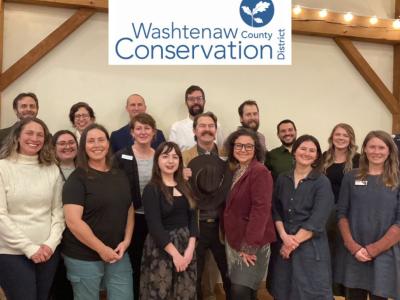On April 22, 2025, the Washtenaw County Conservation District (WCCD) received official notice of the termination of the Michigan Climate Smart Farms Project (MCSFP), a federal initiative designed to support small, underserved farms in adopting climate-smart agricultural practices. While we have since received some outstanding payments for completed work, approximately $54,000 remains unpaid. The termination has significantly impacted our FY2025 budget (October–September), resulting in a loss of $144,611.36 for the fiscal year and a total loss of nearly $500,000 over the life of the project. These financial shortfalls led to reductions in staff hours, loss of employee benefits, and staff departure/position shifts. At the time of termination, 11 farms were enrolled in Phase 1 of MCSFP, receiving direct technical assistance, marketing support, and financial assistance. Over the full course of the project, we had anticipated working with at least 44 farms across southeastern Michigan.
On May 6, 2025, WCCD received confirmation that the Transition to Organic Partnership Program (TOPP), which provides technical assistance for transitioning and existing organic farmers, could resume following a separate federal funding pause. As of May 19, the two staff members employed under this grant—who had been on unpaid leave—have been reinstated, and the project is once again active. To date TOPP has received 66 mentee applications, with 58 mentees actively participating or having engaged with the program. On the mentor side, 47 farmers applied, and 39 are currently serving as mentors. In addition, more than 50 farmers have received technical assistance through TOPP-sponsored events, such as field days and conference sessions. Despite this positive development for TOPP, the pause caused significant setbacks, including lost time and a diminished sense of confidence in the reliability of federally funded programs. We are now focused on rebuilding relationships and restoring trust with program participants as we work to regain momentum.
Looking forward to FY2026, continued uncertainty surrounding federal funding has resulted in the deferral or cancellation of approximately $285,000 in anticipated grant funding and cooperative agreements that WCCD had been pursuing or negotiating.
Beyond the financial impact, these disruptions have demanded a considerable investment of time and effort from WCCD staff and Board Members. The hours spent managing these challenges have significantly reduced our organizational efficiency, hindered internal improvement efforts, and limited our ability to deliver the high level of programs and services we are committed to providing our residents. We appreciate the continued support and understanding of our community during this time.
